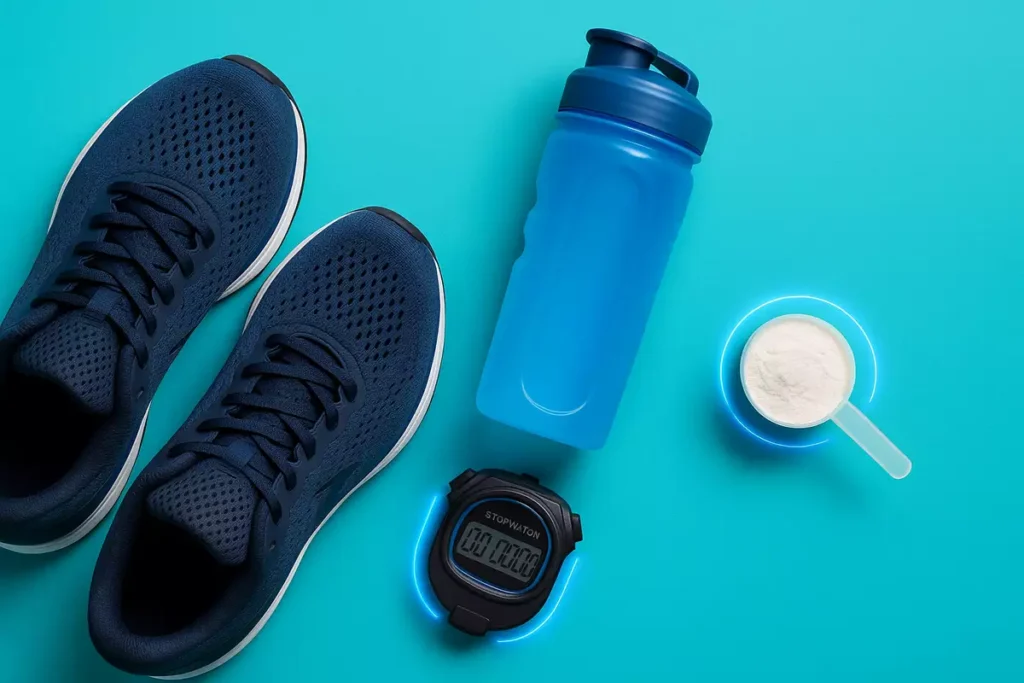Endurance running pushes your body to its limits, draining energy and breaking down muscle.
Essential Amino Acids (EAAs) can change that.
From boosting stamina to speeding up recovery, EAAs help runners train harder, last longer, and bounce back stronger.
Here’s how they work and why they’re a game-changer for endurance athletes.
Table of contents
- Do EAAs Help Endurance Runners?
- What Are EAAs and Why They Matter for Endurance Athletes
- How EAAs Improve Stamina and Long-Distance Performance
- EAAs vs BCAAs: Which Is Better for Runners?
- Best Timing and Dosage of EAAs for Running and Endurance Sports
- Top Benefits Beyond Energy: Recovery, Muscle Preservation, and Hydration
- Practical Tips: How to Include EAAs in Your Training Routine
- Conclusion: Should Endurance Runners Take EAAs?
Do EAAs Help Endurance Runners?
If you’re a long-distance runner or endurance athlete, you’ve probably wondered if Essential Amino Acids (EAAs) are worth adding to your routine.
From my experience as a fitness trainer and endurance trainee, the answer is yes—EAAs can significantly improve stamina, recovery, and overall performance.
I’ve seen it firsthand: less muscle fatigue during long runs, quicker recovery between sessions, and the ability to train more consistently without burning out.
What Are EAAs and Why They Matter for Endurance Athletes

EAAs are the nine amino acids your body cannot produce on its own.
They’re crucial for muscle repair, energy production, and reducing breakdown during long-duration exercise. While endurance training burns through energy stores and stresses muscle tissue, EAAs help you maintain muscle mass and recover faster.
You can also explore EAAs for older adults and how they help with long-term performance sustainability.
How EAAs Improve Stamina and Long-Distance Performance
When you’re running for hours, your body needs a steady supply of amino acids to fuel muscles and prevent fatigue.
EAAs help by:
- Reducing muscle breakdown during prolonged activity.
- Improving endurance by supporting energy metabolism.
- Speeding up recovery, allowing you to train more frequently.
In my own training, I noticed that after adding EAAs before long runs, my legs felt fresher even after 15–20 km. I bounced back much faster for the next workout.
To understand how long EAAs stay active, check how long EAAs stay in your system.
EAAs vs BCAAs: Which Is Better for Runners?

Many runners use BCAAs, but EAAs provide a more complete solution.
While BCAAs (leucine, isoleucine, valine) help with fatigue, EAAs include all nine essential amino acids needed for full muscle repair and endurance support.
I’ve tested both with clients and myself. EAAs consistently led to better results—less soreness, stronger long runs, and better overall performance.
For more insights, check my guide on EAAs vs collagen for strength and recovery.
Best Timing and Dosage of EAAs for Running and Endurance Sports
For best results, I recommend:
- Pre-run: 10g of EAAs mixed with water 20–30 minutes before your run.
- During long events: Sip another 5–10g if your run lasts over 2 hours.
This protocol helped my client Lucas, a 32-year-old triathlete from Germany. He completed his longest 40 km training session without the usual muscle breakdown he used to experience.
If you train on non-running days, here’s how to take EAAs on rest days effectively.
Top Benefits Beyond Energy: Recovery, Muscle Preservation, and Hydration
EAAs don’t just keep you going during a run—they also speed up recovery.
For example, Sofia, a marathon runner I coached from Spain, improved her race pace by 12% and recovered two days faster than usual.
EAAs helped her stay hydrated, protected her muscles, and minimized post-run soreness. To further enhance hydration, you can follow my EAAs hydration mix guide.
Practical Tips: How to Include EAAs in Your Training Routine

- Mix EAAs with electrolytes for better hydration.
- Take them consistently throughout the week, not just on race day.
- Pair them with balanced nutrition to maximize endurance gains.
If you’re sensitive to additives, check this article on EAAs without artificial sweeteners.
From my coaching experience, these small habits compound into major performance improvements over time.
Conclusion: Should Endurance Runners Take EAAs?
While EAAs aren’t absolutely essential, they’re one of the most effective supplements I’ve seen for endurance athletes.
They help you train harder, recover faster, and protect your muscles, making them a smart addition to any long-distance running or endurance training plan.
If you’re serious about improving stamina and recovery, give EAAs a try—you might be surprised at how much smoother your runs feel.



Leave a Reply